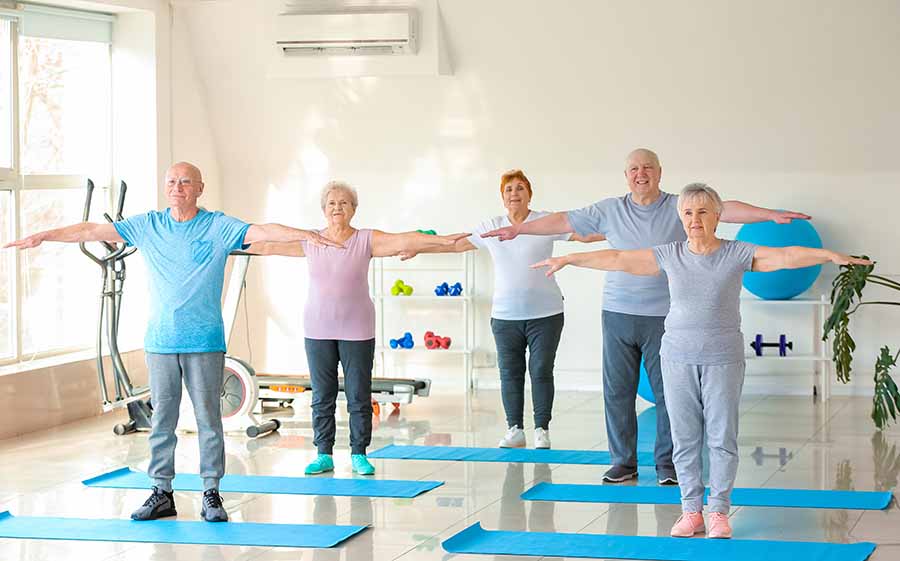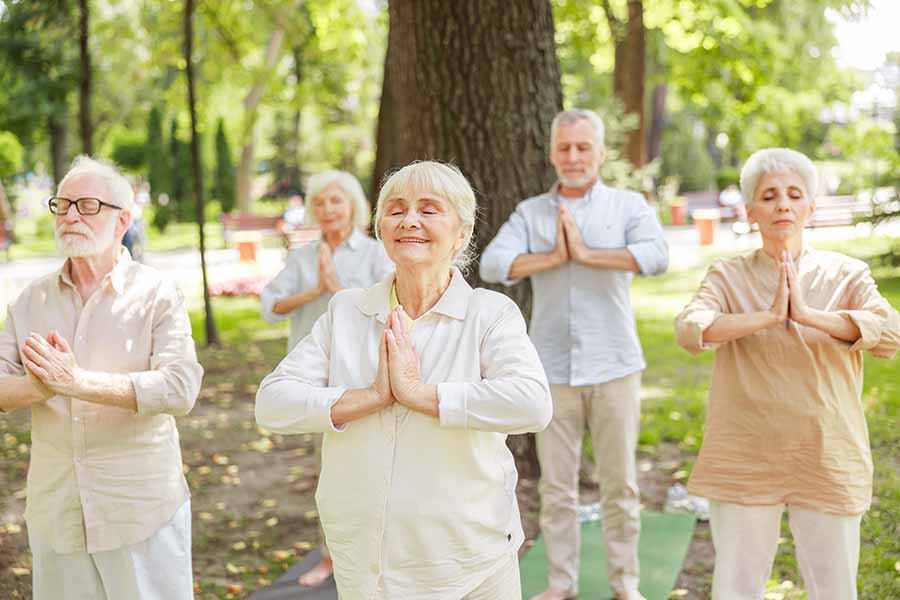How Yoga can be Used in Assisted Living Facilities to Improve Brain Function
by Melrose GardensThe number of seniors in Los Angeles choosing an Assisted Living lifestyle is increasing every year. We know that physical activity has positive effects on cognition and health, but unfortunately the trend of physical activity in seniors is declining. Yoga is an excellent method of exercise that has been shown to greatly benefit the aging population. That’s because yoga is a spiritual discipline based on basic science, focusing on the connection of the mind and body. It is the art and science of a healthy lifestyle. It is a type of exercise in which you move your body into various positions to become more fit physically, improve your breathing, and relax your mind.
Relationship between Yoga and Psychology
Some of us may be familiar with a physical practice called Yoga but the fact is, yoga is much more than just stretching and holding poses for a specific time interval. Yoga is a comprehensive practice - indeed, a way of life - that covers many aspects of life, such as:
- Yama (moral code)
- Niyama (self-discipline)
- Asanas (postures or poses)
- Pranayama (mindfulness of breathing)
- Pratyahara (detachment from senses)
- Dharana (concentration)
- Dhyanna (meditation or positive, mindful focus on the present)
- Savasana (state of rest)
- Samadhi (ecstasy)
Yoga is more focused on the "internal" experience of the practitioner than their "external" experience (i.e., physical anxiety). The true practice of yoga requires self-examination, meditation, and honest self-reflection. It is a way of communicating our thoughts, feelings, beliefs, and values, opening the window to our depths and strengths. Viewed in this light, it’s hard to see yoga and psychology as separate topics!
Yoga and Mental Health
The consensus is that yoga has many positive effects on mental health that outweigh the effects of other low to moderate physical activity and these effects may be due to chemical changes in the brain.
It has been found that practicing yoga helps a greater release of gamma-Aminobutyric acid (GABA) from the thalamus. This molecule GABA acts as a type of "major inhibitor" of the brain, suppressing neural activity resulting in relaxation.
Yoga can simulate the effects of anti-anxiety drugs and alcohol. Yes, doing yoga can make you feel like you have found a beautiful, relaxing cocktail! These findings show that yoga can work to help "reset" your brain to a more calm and rational state, revitalizing basic emotions needed to deal with the stress you face daily.
Yoga makes some good alternative treatments for problems that require medication, as they are natural, accessible to all, and easy to get involved in. In addition, it is a good choice because it is one of the few treatments that connect mind and body. Medication changes, of course, should only be made by a person’s physician, but yoga may be able to play a role in reduction of medication you may be prescribed.
Practicing yoga emphasizes the connection between our mind and our body and encourages us to practice both at the same time. Yoga time requires precise and thoughtful movement, but it also requires rational thinking and an advanced awareness.
Cognitive and Psychological Benefits of Yoga

There are many cognitive benefits of yoga that are useful in preventing different types of mental illness.
- Improved concentration
- Sharper focus
- Increased mental clarity
- Increased ability to be present
- It builds self-confidence
- Increased feelings of well-being
- It helps you learn to breathe to make yourself feel relaxed
- It lets you know more about your posture all the time
- It boosts your IQ
- It increases your strength and endurance
- Positive shifts in the locus of control
- It helps to relieve stress
- Reduced sleep disturbances
Reviews of the literature suggest that yoga has positive effects in reducing symptoms of depression and anxiety, minimizing fatigue, and acting as a buffer against stress. All while providing enhanced feelings of self-confidence.
Yoga and Post-Traumatic Stress Disorder
Many small studies have found that yoga can help with post-traumatic stress disorder (PTSD). It is not used alone, but as an additional supplement to help reduce unpleasant memories and arouse emotions and produce calm breathing. Deep, slow breathing is associated with calm conditions because it helps activate the parasympathetic nervous system.
While many studies show promising evidence, there are still many unanswered questions. Is one style of yoga better for cognitive health than others? What elements are associated with good brain functions? What is the optimal duration of yoga practice? How do yoga interventions compare to meditation interventions? These questions need to be addressed with larger, well-designed, and more randomized trials but in the meantime, doing yoga is a good way to maintain brain health by increasing physical activity and reducing stress.
What We Provide at Melrose Gardens Assisted Living to Keep our Residents Active
There are many methods and options we offer at Melrose Gardens assisted living facility in Los Angeles to design a specific plan of care tailored for individual residents. Please don’t hesitate to call/contact us at Melrose Gardens Assisted living facility to set up a visit and let us answer any questions you may have regarding our beautiful facility. Be well, and we look forward to hearing from you.
Please Contact Us
960 North Martel Ave. Los Angeles, CA 90046

